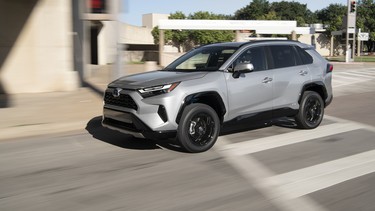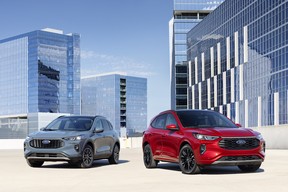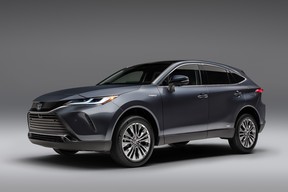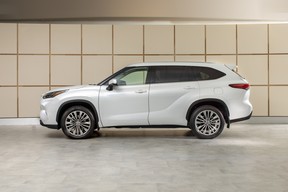Sport-utilities are known for guzzling gas, but these people- and cargo-movers will give you a break at the pumps

Article content
With the price of gasoline doing its best impression of a Gentry Stein Signature yo-yo, budgeting for a month’s worth of driving has become an increasingly difficult task. According to industry-watchers at GasBuddy, the Canadian average price for a litre of regular gasoline has of late fluctuated between $1.77 and $1.38, which is enough to throw anyone’s calculations into a tailspin.
Advertisement 2
Article content
One way to lessen that financial swing? Use less of the stuff. Mathematics teaches us a hike of roughly one-third in a particular expense stings less when the original outlay is 300 bucks instead of 500 or more; that is, choosing a fuel-efficient rig is a sure-fire way to save a few dollars. With that in mind, we present a list of the sipping-est utility vehicles on sale in Canada as this is written in early 2023, a body style selected since it is the beyond-dominant type of vehicle selected by shoppers in this country.
-
![Kia EV6, Toyota RAV4 Prime take top honours at EcoRun 2022]()
Kia EV6, Toyota RAV4 Prime take top honours at EcoRun 2022
-
![Gas, hybrid, or PHEV? Which Toyota RAV4 engine should you buy?]()
Gas, hybrid, or PHEV? Which Toyota RAV4 engine should you buy?
For the purposes of this article, we’ll use the catch-all term of “utility” instead of debating semantics of what is classified as a crossover or SUV. A variety of size classes are selected, plus a couple of luxury offerings. If a vehicle with standard all-wheel-drive managed to pull off the win in its category, it will be noted. All stated fuel economy numbers are the ‘combined’ ratings as given by NRCan for the 2023 model year. Our selections include hybrids, but not plug-in hybrids or pure electrics, since their ability to motor without consuming any fuel at all skews their results in comparison to the gassers. Perhaps we’ll have a list of those at a later time.
Advertisement 3
Article content
Oh — and to put these frugal numbers in perspective, Canada’s thirstiest SUV at this moment is the roarty Cadillac Escalade-V, with its supercharged V8 belting out 682 horsepower and sucking back 18.2 L of high test every 100 kilometres. We reckon if you rub its back after a drive, it’ll let off a healthy burp.
Most Efficient Subcompact Utility: Kia Niro, 4.8 L/100 km

Your author will likely catch some heat from his readers and editors for this classification, but here’s a fun fact: NRCan doesn’t even classify the little Niro as a utility vehicle at all, instead choosing to plunk it into the “small station wagon” class. This, despite an obvious similarity in shape to its crossover cousins. Further cementing its place here is an overall length just a hair greater than the definitely-subcompact Kia Seltos with which it shares a showroom.
Article content
Advertisement 4
Article content
Okay, enough semantics. The funky Kia Niro has earned an NRCan rating is a minuscule 4.8 L/100 km in combined driving conditions. That’s not just better than its competition, it’s better than almost every other vehicle currently on the Canadian market — and ties it with that long-time efficiency stalwart, the Toyota Prius. Note that an FE trim, which stands for “fuel economy” and packs some extra aero tricks, is rated at an industry-leading 4.4 L/100 km. However, that trim is not immediately listed on Kia Canada’s build-and-price tool.
Between the fenders is a 1.6L gasoline four-cylinder engine coupled with a 32-kW permanent-magnet synchronous electric motor, working together to make a combined maximum power output of 139 horsepower and 195 lb-ft of torque. At hand is a six-speed dual-clutch transmission.
Advertisement 5
Article content
- Fuel economy: 4.4 city / 4.4 highway / 4.4 combined (L/100 km)
- Canadian MSRP: $29,995 + $1,995 freight & PDI charge
- Comprehensive warranty: 5 years / 100,000 km
- Powertrain warranty: 5 years / 100,000 km
Alternatives: The little Niro occupies a unique spot in the market, overlapping a couple of segments — and even a few products in its own showroom. One could argue for the new Prius as an analog ($36,650, 4.8 L/100 km) though it has all-wheel-drive and is decidedly not a crossover. The pert Hyundai Kona is similar in size and mission, but doesn’t offer a hybrid powertrain. See? We told you it is a difficult car to classify.
Most Efficient Compact Utility: Ford Escape Hybrid AWD and Toyota RAV4 Hybrid AWD (tie), 6.0 L/100 km
Advertisement 6
Article content

A pair of popular hybrid models sit atop the podium in the compact utility class in terms of fuel economy, though which one you select may be determined on where you do most of your driving. While both the Escape and RAV4 earn a combined rating of 6.0 L/100 km from NRCan, the Ford bests the Toyota by 0.2 L/100 km in city environs. That performance is reversed on the highway, resulting in an overall tie.
At the Blue Oval, one will find a 2.5L four-cylinder gasoline engine tag-teaming an electric motor to make 192 horsepower and running just fine on regular unleaded. Note the hybrid’s cargo space is three cubic feet (88 litres) less than the traditional gasser Escape thanks to its hybrid gubbins. Meanwhile, the Toyota also uses a 2.5L four-banger engine, but deploys powerful motor-generators to up its horsepower game to 219 net system ponies. Both brands fit a continuously variable transmission to their rigs.
Advertisement 7
Article content
Ford Escape Hybrid AWD
- Fuel economy: 5.6 city / 6.5 highway / 6.0 combined (L/100 km)
- Canadian MSRP: $40,349 + $2,095 destination charge
- Comprehensive warranty: 3 years / 60,000 km
- Powertrain warranty: 5 years / 100,000 km
Toyota RAV4 Hybrid AWD
- Fuel economy: 5.8 city / 6.3 highway / 6.0 combined (L/100 km)
- Canadian MSRP: $32,590 + $1,930 freight & PDI charge
- Comprehensive warranty: 3 years / 60,000 km
- Powertrain warranty: 5 years / 100,000 km
Alternatives: Customers in this segment are spoilt for choice, including the Kia Sportage Hybrid AWD and Honda CR-V Hybrid AWD. Both just miss out headlining our list, posting efficiencies of 6.2 and 6.4 (L/100 km) respectively on the combined driving cycle. Kia prices its entrant at $36,495, while it’ll take $48,890 to get into the Honda, since it offers hybrid power only on top-rung Touring trims.
Advertisement 8
Article content
Most Efficient Mid-Size Utility: Toyota Venza AWD, 6.1 L/100 km

The nifty Venza is an oddity in the Big T’s lineup, since it represents the rare instance of a Toyota utility offering more style than practicality. Swoopy body language is attractive to most eyes, especially when draped in an expressive colour like Blueprint or Ruby Flare Pearl. As per usual at this brand, trims range from base LE to snazzy Limited, with a popular XLE wedged between.
No matter which trim is chosen, a 2.5L four-cylinder engine is paired with a hybrid drive system comprised of three high-torque electric motor-generators and a continuously variable transmission. This team delivers a system total of 219 horsepower, and all 2023 Venza models come standard with all-wheel-drive, in which up to 80 percent of the power can be directed rearward when conditions warrant. Under normal driving situations, 100 per cent of torque is sent to the front wheels of this two-row utility.
Advertisement 9
Article content
- Fuel economy: 5.9 city / 6.4 highway / 6.1 combined (L/100 km)
- Canadian MSRP: $40,050 + $1,930 freight & PDI charge
- Comprehensive warranty: 3 years / 60,000 km
- Powertrain warranty: 5 years / 100,000 km
Alternatives: While the Hyundai Santa Fe Hybrid may not immediately seem like a competitor for the Venza given the latter’s styling chops and the former’s more traditional utility shape, there is but two inches of length difference between this pair of two-row crossovers. Hyundai has done well with its hybrid powertrain, falling short of the Toyota but still returning a respectable 7.4 L/100 km in combined conditions.
Most Efficient Large Utility: Toyota Highlander Hybrid AWD, 6.7 L/100 km

Yes, okay — at the risk of sounding like a broken record, we again find a Toyota atop the standings for fuel economy in a particular segment. This time around, the three-row Highlander makes dandy use of the brand’s deep well of knowledge in hybrids to produce some remarkable numbers from what amounts to a very large vehicle.
Advertisement 10
Article content
These rigs are built around a 2.5L four-cylinder engine, two electric motor-generators, and an electronically controlled continuously variable transmission. This combination delivers 243 total system horsepower, and is directly responsible for the stellar fuel efficiency rating. By the way — this vehicle can tow 1,588 kg (3,500 lbs) when properly equipped.
- Fuel economy: 5.7 city / 6.4 highway / 6.0 combined (L/100 km)
- Canadian MSRP: $48,150 + $2,205 freight & PDI charge
- Comprehensive warranty: 4 years / 80,000 km
- Powertrain warranty: 6 years / 110,000 km
Alternatives: One needs to march way up the fuel economy consumption list to find another three-row utility — such is the stellar efficiency of this year’s Highlander Hybrid. As an example of this vast delta, the new Explorer Hybrid is similar in size and mission, but can only manage 9.6 L/100 km combined. Over at Kia, we find the Sorento Hybrid performing 0.1 L/100 km better than the Toyota, but despite having three rows of seats, it’s actually several inches shorter, and has nearly 40 fewer cubic feet of measured passenger space, which earns it a smaller classification by the eggheads at NRCan.
Advertisement 11
Article content
Most Efficient Luxury Small Utility: Lexus NX 350h AWD, 6.0 L/100 km

There’s little doubt that the Lexus brand is one which springs immediately to mind for many Canadians when asked to identify a luxury vehicle. It is of little irony that Lexus was arguably the first to apply extravagant trappings to a mainstream crossover-type vehicle when it introduced the RX model over 20 years ago. These days, the NX has largely stepped into that model’s original role, after the OG grew in size and gained a third row of seats in some configurations.
Powering the fuel-sipping NX 350h is a 2.5L four-cylinder gasoline engine paired with a hybrid system and electronically controlled continuously variable transmission. All-wheel-drive is standard thanks to the electric motors doing duty on the axles. In total, the powertrain delivers 239 horsepower at maximum output, though it’s worth noting Lexus recommends premium fuel for this vehicle. Good news — copies of the NX Hybrid are built right here in Canada.
Advertisement 12
Article content
- Fuel economy: 5.7 city / 6.4 highway / 6.0 combined (L/100 km)
- Canadian MSRP: $50,420 + $2,205 freight & PDI charge
- Comprehensive warranty: 4 years / 80,000 km
- Powertrain warranty: 6 years / 110,000 km
Alternatives: The NX sits in an odd spot, sized larger than the subcompacts at its competitors, but slightly smaller than their compacts. An approximate parallel to the Lexus NX 350h is the BMW X3 xDrive 30e, though it is a plug-in hybrid powered by a team good for 288 horses, making the Bimmer more powerful (and slightly longer) than the NX. It consumes more fuel when not in electric-only mode, returning 10.1 L/100 km combined, according to NRCan.
Most Efficient Luxury Large Utility: BMW X5 xDrive40i, 10.4 L/100 km

This popular Bavarian machine has been a cornerstone of the BMW brand for ages, supported by its X6 cousin which trades a bit of cargo space in favour of a swoopier roofline. Both models earn the win here, as they are powered by the same turbocharged six-cylinder engine making 375 horsepower. Various and sundry packages add to the X5/X6 visual drama, but do nothing in terms of grunt or efficiency, provided one sticks with this trim’s drivetrain.
Advertisement 13
Article content
Fresh for this model year, your neighbours will know you purchased the latest model instead of the leftovers thanks to a revised front fascia, smaller headlights, and optional illuminated grille (yes, really). Inside, shoppers will find a modern cockpit-style design with an all-digital curved display featuring the latest in BMW infotainment and driving aids.
- Fuel economy: 11.4 city / 9.3 highway / 10.4 combined (L/100 km)
- Canadian MSRP: $86,000 + $2,470 freight & PDI charge
- Comprehensive warranty: 4 years / 80,000 km
- Powertrain warranty: 4 years / 80,000 km
Alternatives: Note the Volvo XC90 ‘B5’ variant is listed by NRCan as earning a 9.6 L/100 km rating, but that powertrain appears to be unavailable in that model for Canada at present. The more powerful ‘B6’ returns 10.6, according to the gubmint. Mercedes-Benz GLE 450 4MATIC and its Coupe variant are both good for 10.5 L/100 km in combined driving conditions. In fact, a number of luxury large utilities are stuck around the 10.5 mark, including the Genesis GV80, Cadillac Escalade, and Infiniti QX60.
Stay connected with us on social media platform for instant update click here to join our Twitter, & Facebook
We are now on Telegram. Click here to join our channel (@TechiUpdate) and stay updated with the latest Technology headlines.
For all the latest Automobiles News Click Here




Comments
Postmedia is committed to maintaining a lively but civil forum for discussion and encourage all readers to share their views on our articles. Comments may take up to an hour for moderation before appearing on the site. We ask you to keep your comments relevant and respectful. We have enabled email notifications—you will now receive an email if you receive a reply to your comment, there is an update to a comment thread you follow or if a user you follow comments. Visit our Community Guidelines for more information and details on how to adjust your email settings.
Join the Conversation